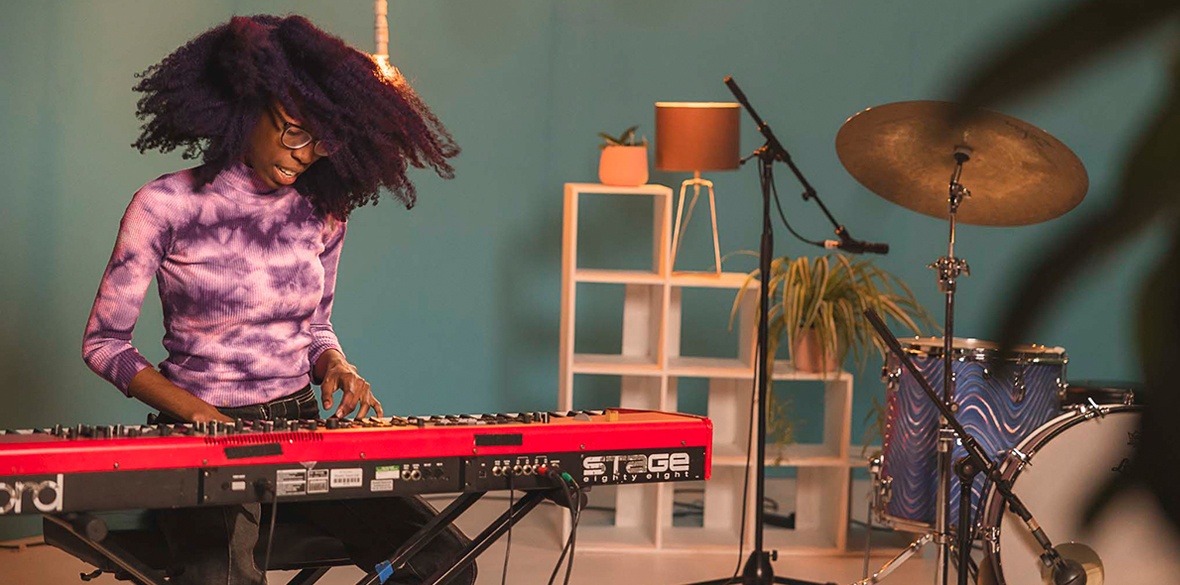This is the last article you can read this month
You can read more article this month
You can read more articles this month
Sorry your limit is up for this month
Reset on:
Please help support the Morning Star by subscribing here
IT was an especially groovy session at the Vortex, with Roella Oloro’s sparkling piano, the plummeting, dancing bass of Rio Kai and the deft, everywhere drums of Andee Liu.
Roella plays in and out of the tradition with such pride and skill, that if you shut your eyes you could be hearing moments of Geri Allen, Mary Lou Williams, Tommy Flanagan or her earliest inspiration, Oscar Peterson. How they would have loved her!
As she began, listeners knew the unambiguous sources and springs of her artistry, dedicating her first piece to all those who marched for George Floyd, with her trio-mates adding a depth of insurgent undertow to Roella’s passionate power. As her wordless vocals stretched skywards, Kai’s bass stayed close to the earth like the soil of the soul, and his exchanges with Liu’s restless drums were like the palaver of brothers.
The three of them: so young, with so much precious talent, as they strode into The Saints as you have never heard it played before, or the tenderness of Coltrane’s Naima, the beauty of its love-melody passing gently over Dalston’s rooftops.
Roella was born in Gloucester in 1998, with an IT prison teacher mum of Jamaican heritage and a Tesco delivery driver Dad of Nigerian roots. They both played piano “as a passion rather than a profession,” and her mum was her first piano teacher before she began on clarinet at 7 and saxophone at 13. As a child she would jam on piano and bass guitar with her younger drummer brother.
“Growing up in rural England as a young black musician, my friends liked pop and there was an emphasis on classical music if I was to be seen as a proficient pianist. I now recognise this as some internalised racial stigma, because I would think I was pre-disposed not to have a good classical technique because I was a black musician, there being no examples of black classical musicians available to me. So thank God for Nottingham’s Kenneh-Mason family in our current age! The rise of that family sent me on a learning journey!
“As a teenager I loved jazz, listening to Oscar Peterson and Tommy Flanagan, then bebop via Charlie Parker and Cannonball Adderley. It took me a while to get used to the angularities of bebop as my ears hadn’t yet learned to recognise all the implied harmonies. I heard a lot of reggae growing up, mainly from hymns in the local Pentecostal church. When I left school I took a gap year to mentor a student with functioning autism in my old secondary school.
“Then, in 2017 I went to Laban music school in south London. I was much encouraged by BBC’s Young Jazz Musician of the Year, pianist Deschanel Gordon, young saxophonist Sylvan Biscoe, drummer Simon Lamb and the other young peers I met through the Tomorrow’s Warriors project. It was at Laban that I became attuned to my Nigerian culture, as I lived in Woolwich with its strong Nigerian community.”
What about Rio and Andee, her present trio-mates?
“I perform with many configurations, but Andee I met at Berklee College, Boston, USA where I studied from 2019-2023. He’s an incredibly talented Welsh-Chinese drummer. Rio’s bass playing captivates me. Equally good on upright and electric bass, he has a great sound and incredible ears, with beautifully constructed linear ideas.
“At Berklee, my tutors, drummer Terri Lyne Carrington and Panamanian pianist Danilo Perez are developing the next generation of socially conscious musicians. They both played in the great saxophonist Wayne Shorter’s last quartet. The kind-hearted and passionate concern for the world around him which infused his music formed part of Terri and Danilo’s social justice inspiration for equity and equality through music. She is director of the Jazz and Gender Justice Institute, calling out the music’s patriarchal nature and combatting the erasure of women's contributions to jazz history, and he is artistic director of the Global Jazz Institute.
“I’m grateful I studied with both at Berklee, and now recognise how their teachings relate to Britain. When it comes to its colonial past and how this still feeds into its complex societal issues, there’s still a lot of reckoning and unearthing to do for forward movement to be attained. Music can be a part of that reckoning.
“It can help to forge better relations between the current state of our multicultural population and the interconnections with their future offspring. The London jazz scene is already a strong catalyst for inciting this change, with bands like the Ezra Collective, Koko-Roko and artists like saxophonist Nubya Garcia gaining international reach as strong sonic voices for British youths of minority ethnic backgrounds.”







